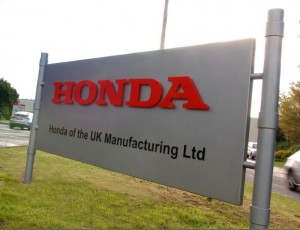One of car giant Honda’s top bosses has warned of the possible “harm” of leaving the European customs union on its giant Swindon plant.
Honda senior vice-president of Honda Ian Howells said the plant relied on a large pan-European network of suppliers to deliver 2 million components to its car and engine assembly lines every day. 
The plant, which employs around 4,000 people, operates a strict “just-in-time” manufacturing process which means it holds very little stock. Deliveries from suppliers go straight to the assembly lines.
Speaking at a summit staged by UK car industry group SMMT, Mr Howells said: ““We have deliveries of 2m components every day, arriving on 350 lorries.
“We have just one hour of supply of parts at the side of the line, and half a day in local warehouses.
“From that description of the flow of goods you can see how new customs rules would harm our ability to produce cars.”
Mr Howell’s comments mark a major shift in Honda chiefs’ traditional reluctance to speak out publicly on political matters. However, they have remarked previously on the impact that Brexit – especially a ‘hard’ Brexit – could have on the Swindon plant, which employs
Honda also is concerned about the government’s ability to manage an upgrade to computer systems that track imports and exports of goods, he said.
The system is set up to handle 60m transactions but after Brexit it would be six times this, he said.
Last year Honda recruited an extra 650 workers to begin building its 10th generation Civic car.
The SMMT summit was held as the UK government began Brexit talks with the EU.
Business West – the region’s largest business group and the organisation behind the Swindon & Wiltshire Initiative – said Mr Howell’s comments represented the view of many firms in the area.
Its director in Swindon Ian Larrard said: “Honda is one of Swindon’s largest employers and has a long and successful history within the town. Swindon is the home of Honda’s only UK plant, so these comments from Honda are of direct relevance to the town and its economy. It is extremely rare for Japanese companies to make public statements concerning a foreign government, so we should take this speech seriously. It is an indication of the issue’s importance to the firm and of their underlying concern about the current direction of travel of Brexit negotiations.
“The request for the UK to remain in the customs Union reflects a worry that leaving it will create additional paperwork and compliance issues that would hurt Honda’s competitiveness and ability to operate. Automotive manufacturing depends on ‘just in time’ supply chains which stretch across the whole of the EU. If done badly, leaving the customs union will mean having to fill in forms for every part that criss-crosses the UK border. This is likely to make it much more burdensome to operate and lead to a sharp increase in unproductive administrative costs.
“Honda’s concern about leaving the customs union is matched by the concerns of hundreds of small and medium sized exporters across the region. When we surveyed our business members, they identified “the ability to trade without additional paperwork” as their number one priority for Brexit negotiations. We also found that 51% viewed the prospect of leaving the customs union as ‘negative’ or ‘very negative’; while only 14% viewed it as ‘positive’ or ‘very positive’. For many smaller firms, the additional forms required to export to Europe after Brexit could prove a significant problem for their competitiveness and export performance.
“It also reflects a broader concern within the business community that government simply hasn’t been listening – and does not understand the difficulties that many firms will have in adapting. For example, we have yet to see a robust cost-benefit analysis by government of the impact of leaving the Customs Union on the economy. It is now time for the government to shift its negotiating position and also to start to address the practical obstacles that many firms will face post Brexit.”














